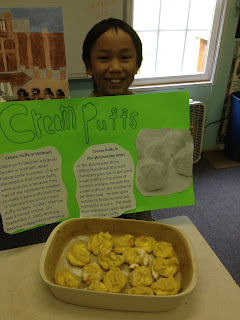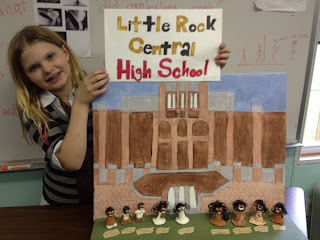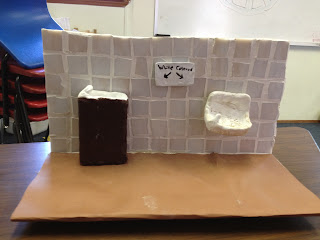Over the course of the year, our novel studies in language arts have often reflected our topics in social studies. In April, however, students were able to choose a research topic to partner with a work of historical fiction. In addition to reading and researching, each student wrote a paper to compare and contrast and created a project to present to their classes.
 City of Orphans
City of Orphans by Avi
; New York at the turn on the century

Gordon Korman's
Titanic trilogy; the Titanic
 Cracker!: The Best Dog in Vietnam
Cracker!: The Best Dog in Vietnam by Cynthia Kadohata; the role of dogs in war
 War Horse
War Horse by Michael Murpurgo; the role of horses in WWI
 Esperanza Rising
Esperanza Rising, by Pam Munoz Ryan; Mexican immigration during the 1930s
 The Rock and the River
The Rock and the River by Kekla Magoon; Chicago 1968
 Kira Kira
Kira Kira, by Cynthia Kadohata; Japenese Americans in the 1950s

Gordon Korman's
Titanic trilogy; the Titanic

Gordon Korman's
Titanic trilogy; the Titanic
 So Hard to Say
So Hard to Say, by Alex Sanchez; the consequences of bullying
 Witness
Witness by Karen Hesse; the rise of the KKK
 Al Capone Does My Shirts
Al Capone Does My Shirts by Gennifer Choldenko; Alcatraz
 Timothy of the Cay
Timothy of the Cay, by Theodore Taylor; German U-boats
 Weedflower,
Weedflower, by Cynthia Kadohata; Japanese internment camps
 The Cay
The Cay, by Theodore Taylor; German U-boats
 City of Orphans
City of Orphans by Avi; food in the early 1900s
 The Wednesday Wars
The Wednesday Wars, by Gary Schmidt; the Vietman War
 Witness
Witness, by Karen Hesse; the rise of the KKK
 A Wrinkle in Time
A Wrinkle in Time, by Madeleine L'Engle; the biography of L'Engle
 Airborn
Airborn, by Kenneth Oppel; zeppelins
 The End of Baseball
The End of Baseball, by Peter Schilling Jr.; the desegregation of baseball
 The Lions of Little Rock
The Lions of Little Rock, by Kristin Levine; the Little Rock Nine
 So Hard to Say
So Hard to Say, by Alex Sanchez; gay rights
 War Horse
War Horse, by Michael Morpurgo; the role of the United States in WWI
 Lily's Crossing
Lily's Crossing by Patricia Reilly Giff; refugees of WWII

Cais read
Glory Be, by Augusta Scattergood and researched segregation in the 1960s.

Garrett read
City of Orphans, by Avi and researched the slums in New York City in the early 1900s.



























No comments:
Post a Comment